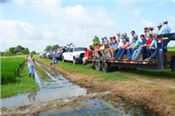LSU AgCenter Testing New Rice Herbicides
CROWLEY, LA.
An LSU AgCenter weed scientist recently talked about his research with a new herbicide and rice system that will help control red rice and other grasses in rice fields.
AgCenter weed scientist Eric Webster told farmers and crop consultants at the Acadia Parish Rice and Soybean Field Day about his work with the new Provisia system. About 90 people attended the event.
Much of Webster’s research involves testing different weed herbicides with the Provisia herbicide to see if they are compatible.
Controlling red rice and grasses will be easier with the new Provisia technology, but what about broadleaf weeds?
“Everything you can spray in a rice field we have tank-mixed with Provisia somewhere on these 15 acres,” Webster said.
In some areas of Louisiana, water seems to interfere with some mixtures and prevents the herbicides from working, he said. The herbicide Permit consistently works well with Provisia.
Webster also is studying Provisia mixed with the new herbicide benzobicyclon.
Webster’s weed control research also includes the Dow product Loyant to see if young rice is injured by the herbicide.
AgCenter rice breeder Adam Famoso said the Provisia rice system will help clean up fields with outcrosses from Clearfield varieties, and it should be available in 2018.
He also said 12 lines of Jazzman Clearfield are being grown this year, with two lines to be chosen for seed increases.
AgCenter entomologist Mike Stout said insect pressure has been intense.
“This year we’ve had more insect problems than any I can remember,” he said. It’s one of the worst years for rice water weevils at the AgCenter H. Rouse Caffey Rice Research Station.
The count for weevils is 1.5 times the usual amount, he said, adding that insecticides can be sprayed to treat them.
South American rice miners are also infesting fields throughout south Louisiana, he said, but no treatment options are available.
Symptoms of the rice miner include a withering leaf tip, but Stout said it’s likely that the pests won’t reduce yields by much.
Fall armyworms have been a problem, along with chinch bugs and grasshoppers, he added.
Stout said he’s not sure if rice stinkbugs will be a major problem this year.
AgCenter rice specialist Dustin Harrell agreed that insect pressure is unusually high.
“This year is going to be remembered as the year of insects,” Harrell said. Rice miners are widespread, but rice plants seem to outgrow the leaf damage.
AgCenter plant pathologist Don Groth said recent rain is creating wet conditions that will allow disease to flourish.
“These are just ideal conditions for sheath blight development,” Groth said. Some fields have sheath blight problems surfacing, but others have none.
AgCenter soybean specialist Ron Levy said Louisiana has 1.4 million acres of soybeans, but he doubts much more will be planted because of wet soils and frequent rainfall. Late soybean planting usually results in reduced yields, he said.
Levy’s research includes a study of reduced seeding rates. A small amount of Monsanto Xtend soybeans was planted in Louisiana, no more than 10,000 acres, but elevators have warned growers they won’t accept the beans until the European Union grants approval. The soybeans can tolerate dicamba and glyphosate herbicides.
Levy said his core block studies and variety trials include Xtend. ∆

LSU AgCenter soybean specialist Ron Levy, far left, talks at the Acadia Parish Rice and
Soybean Field Day on June 15 about research he is conducting to reduce
seeding rates. Levy said soybean prices have increased recently.
Photos by Bruce Schultz

LSU AgCenter weed scientist Eric Webster talks about the new Dow Agrosciences
herbicide Loyant at the Acadia Parish Rice and Soybean Field Day on June 15.
He said the product has shown potential at controlling grasses and broadleaf weeds.
Loyant awaits approval by the U.S. Environmental Protection Agency.